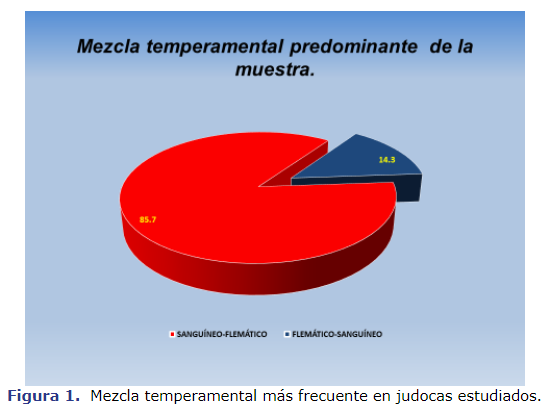Caracterización del temperamento de judocas élites cubanos
Main Article Content
Resumo
The control and regulation of temperamental or psychodynamic activity is essential to improve the performance of athletes, since the effectiveness with which technical-tactical actions are carried out depends largely on this. Many judocas see their performance affected by situations related to their temperamental reactions. There aren't research enough that allow knowing, correcting and enhancing the aforementioned reactions from a collegiate psychologist-coach psychopedagogical work. Because of that the purpose of this study to characterize the temperament of the Cuban elite judokas, as a premise to identify the properties of temperament that this sporting discipline requires, which It would allow. A quantitative approach was used, with a non-experimental, transectional and exploratory-descriptive design with a sample of 14 judokas from the Cuban national team. The Inventory for the determination of temperament (IDETEM-1) was applied, the temperamental mixture was determined and the predominant individual and team properties of the nervous system and psychodynamics were identified. A high percentage of the sample and therefore the team in general is characterized by having a temperamental blood-phlegmatic mixture and as predominant properties strength, balance, mobility, psychic dynamism and lability within those of the Nervous System and as psychodynamics, endurance, moderate reactivity, fast psychic rhythm, plasticity, extraversion and activity.
Downloads
Article Details

This work is licensed under a Creative Commons Attribution-NonCommercial 4.0 International License.
Aquellos autores/as que tengan publicaciones con esta revista, aceptan los términos siguientes:
- Los autores/as conservarán sus derechos de autor y garantizarán a la revista el derecho de primera publicación de su obra, el cuál estará simultáneamente sujeto a la Licencia de reconocimiento de Creative Commons 4.0 Reconocimiento-NoComercial que permite a terceros compartir la obra siempre que se indique su autor y su primera publicación esta revista. Bajo esta licencia el autor será libre de:
- Compartir — copiar y redistribuir el material en cualquier medio o formato
- Adaptar — remezclar, transformar y crear a partir del material
- El licenciador no puede revocar estas libertades mientras cumpla con los términos de la licencia
Bajo las siguientes condiciones:
- Reconocimiento — Debe reconocer adecuadamente la autoría, proporcionar un enlace a la licencia e indicar si se han realizado cambios. Puede hacerlo de cualquier manera razonable, pero no de una manera que sugiera que tiene el apoyo del licenciador o lo recibe por el uso que hace.
- NoComercial — No puede utilizar el material para una finalidad comercial.
- No hay restricciones adicionales — No puede aplicar términos legales o medidas tecnológicas que legalmente restrinjan realizar aquello que la licencia permite.
- Los autores/as podrán adoptar otros acuerdos de licencia no exclusiva de distribución de la versión de la obra publicada (p. ej.: depositarla en un archivo telemático institucional o publicarla en un volumen monográfico) siempre que se indique la publicación inicial en esta revista.
- Se permite y recomienda a los autores/as difundir su obra a través de Internet (p. ej.: en archivos telemáticos institucionales o en su página web) antes y durante el proceso de envío, lo cual puede producir intercambios interesantes y aumentar las citas de la obra publicada. (Véase El efecto del acceso abierto).
La revista no se responsabiliza con las opiniones y conceptos emitidos en los trabajos, son de exclusiva responsabilidad de los autores. El Editor, con la asistencia del Comité de Editorial, se reserva el derecho de sugerir o solicitar modificaciones aconsejables o necesarias. La mención de marcas comerciales de equipos, instrumentos o materiales específicos obedece a propósitos de identificación, no existiendo ningún compromiso promocional con relación a los mismos, ni por los autores ni por el editor.
Referências
Cruz, M., & Maganto, C. (2003). Importancia del estilo cognitivo y el temperamento en el ámbito escolar. Revista Acción Psicológica, 29-39. ISSN 2255-12
Fuentes, M E. (2006). El temperamento en la formación del deportista. Habana: Pueblo y Educación.
Fuentes, M E; Sánchez, M E. (2011). Relevancia del temperamento en el desempeño del deportista. (M. Venero, Ed.) La Habana, Cuba: Editorial Deportes.
Iglesias, D. S. (2010). El temperamento en la regulación de la personalidad. Revista de la Facultad de Ciencias de la salud. DUAZARY.ISSN 2538-9971
Pérez, N. S. (Enero de 2016). Contribución del temperamento al ajuste escolar procesos cognitivos y socioemocionales https//dialnet.unirioja.es//tesis/institucion/819024.
Sánchez, M. E. (2005). Psicología del entrenamiento y la competencia deportiva. La Habana: Deportes.
Strelau, J. (1982). Papel del temperamento en el desarrollo psíquico. Moscú: Progreso.

